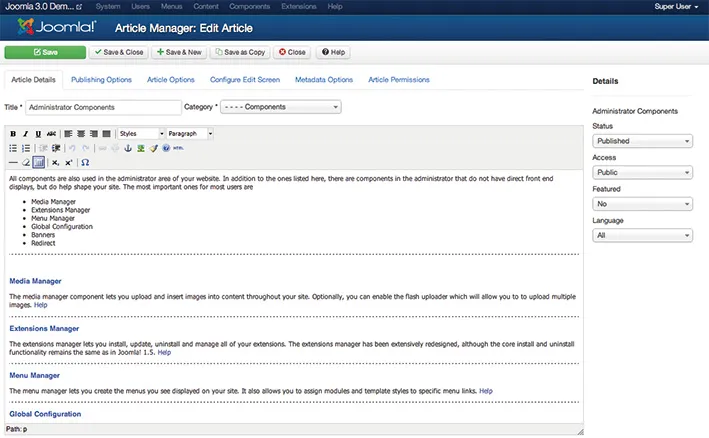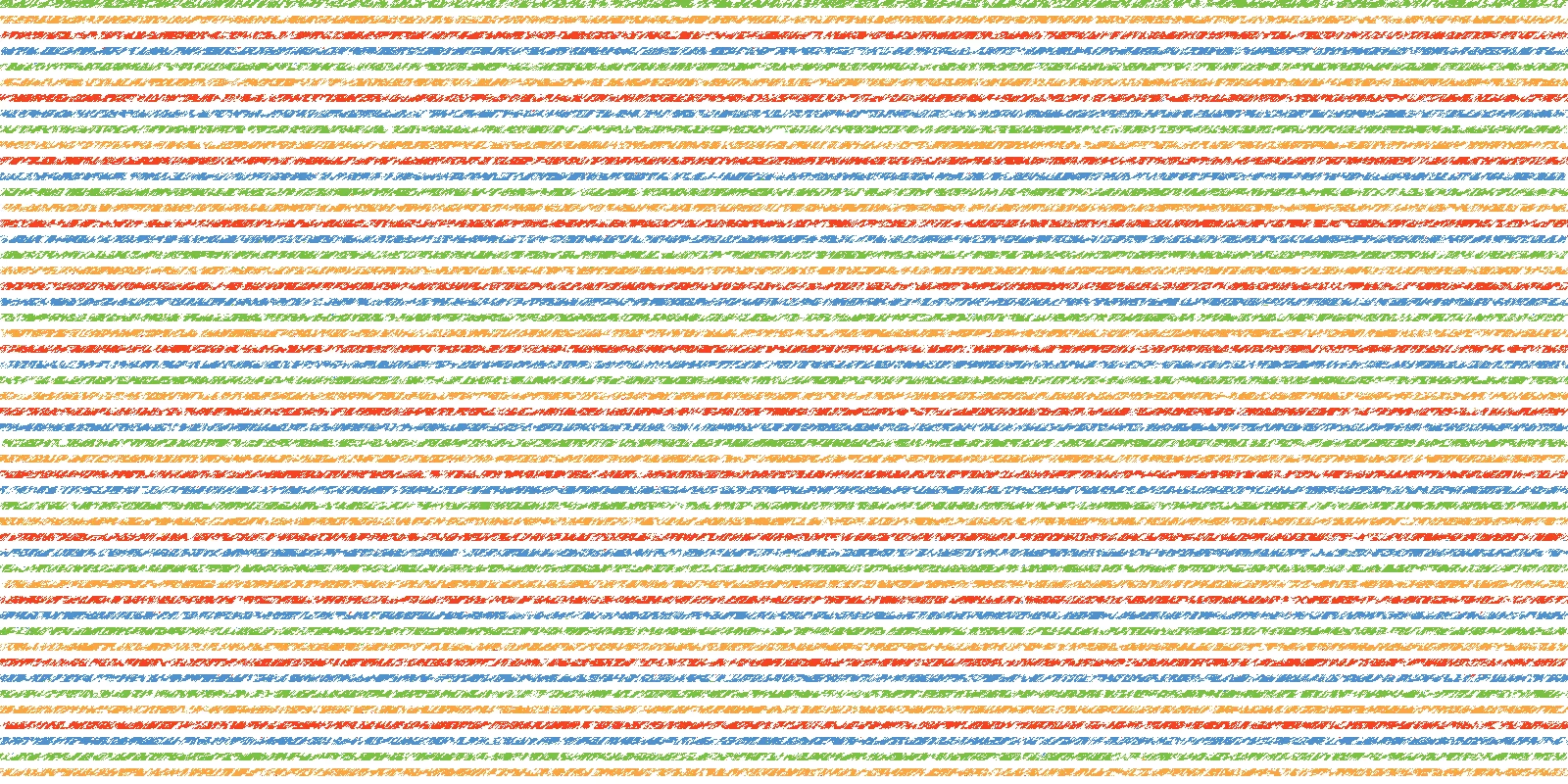
Back-end example: article edit form
Joomla! is the second-most popular CMS behind WordPress. Over the years it has earned a permanent place in the world of open source CMS.
PHP
GPL
The Joomla! Project was forked from another system called „Mambo“, whose trademark was held by a single company. Because of this fact, it was not possible for the community to freely determine the future development direction of the project. To prevent a repeat of this story, it was very important for the founders of the Joomla! project, that the project was as independent and transparent as possible. That is the reason why they decided to found a non-profit organization that holds the trademark and does not tolerate violations of the open source license.
In addition, the project has put much effort into establishing broad-based funding, which does not bind it too much to individual donors. Thereby the project is largely independent from the interests of individual persons or companies. Today the project is financed by donations of various sizes, advertising revenues, merchandising and co-operation agreements with web hosts which creates a very solid financial base.

Back-end example: article edit form
The CMS is in comparison with other systems relatively easy to learn. The installation is done within 5 minutes and works on almost every web host. Numerous freely available tutorials and last but not least the intuitive interface quickly lead to successes. Another great feature is that, thanks to more than 7,500 available extensions and countless templates, it is possible to implement complex projects with almost no previous knowledge.
Thus, even users who have only basic skills are able to design and operate their own sites. A valuable resource is the monthly published and freely accessible Joomla! Community Magazine which provides useful tricks.
Online magazines, enterprise websites, intranets and extranets, e-commerce sites, government and NGO sites, freelancers‘ portfolios, directories, social networks, blogs, schools, family sites … the list of sites built with Joomla! is long and manifold.
The greatest strength of Joomla! is the almost limitless adaptability to individual needs. The system provides both users and developers a variety of interfaces, which allow you to change almost every detail, without having to make any adjustments at the core of the system. This flexibility makes Joomla! an indispensable tool with which even complex sites can be built.
The two largest deficits of Joomla! are the lack of „classic“ content management functions and the missing multi-site capabilities.
The difficulties in the area of traditional content management are caused by the way content is created in Joomla!. By default, you will get one editor-based textarea which is used to create your articles. That sounds intuitive but makes it sometimes hard to realize complex formattings. A significant improvement is hence the provision of „custom fields“, which are available since version 3.7.0. Individual input fields can be integrated directly into the system without overrides or third-party extensions.
The other missing feature is the multi-site capability which means the support for management of separate websites within one installation. But this problem can also be fixed by using third-party extensions.
With Joomla! it is possible to realize web projects of almost any size. The system is particularly suitable for medium-sized projects that will have a variety of functions, but aren‘t depending on features of the classic enterprise content management.
Worldwide, there are millions of Joomla! based sites, resulting in a huge community. In the official forum there are more than 700,000 registered users, and there are even more users in local communities. Regular local meetings and national and international events ensure a continuous exchange, so there is always a helpful user who can be asked in case of questions.
A very special thing is that the international community has a very pleasant atmosphere, which is appreciated by developers and users a lot. The joint work on the system welds together and makes it a unique experience to be a part of the community.
Joomla! is a work on the scripting language PHP and supports various database systems (MySQL, MSSQL, PostgreSQL) to store the data. The CMS is based upon a self developed, object-oriented MVC framework, which is constantly developed and evolved in a separate project called the Joomla Platform. The libraries and classes of the platform can also be used for one‘s own, CMS-independent projects and applications. Thereby the platform is supported by developers who are not directly associated with the CMS. The overall system has very good performance and doesn‘t have any special requirements.
In both, the front- and the backend, the Bootstrap Framework is used since Joomla 3.0. This popular HTML and CSS framework is used for all kind of interface elements of the system which makes it much more easier for frontend-developers to work with it. Together with the easy to learn template system, Bootstrap allows you to realize your own layouts and designs in no time. A pleasant side effect of bootstrap is that the admin area of Joomla! 3.0 is optimized to run on smartphones and tablets.
The official documentation for is a wiki and is available at docs.joomla.org. The community is constantly working on updating and translating the documentation. With each new release, the documentation is updated so that the right information is available for each version. The Joomla! Documentation has information for all knowledge levels, for users, beginners, administrators and developers. Over recent years the Joomla! documentation have been completely revised and released with a new appearance.
In addition to the official documentation numerous videos, tutorials and blog posts have been published for free and available online. There are also numerous books and articles in trade journals that extensively explain Joomla! and its functions.
The upcoming Joomla! 4 (scheduled for 2018) will bring many changes. There will be a new admin interface and a new media manager. In addition, it will be upgraded to Bootstrap 4, the Joomla framework will be reworked and there will be fundamental changes in the areas of SEO, performance and the API connection. A new installer will simplify the installation for beginners and provide the ability to edit demo data more easily. PHP7 becomes a minimum requirement for Joomla! 4. Joomla! 3.9 is expected to be the last Joomla! version from the 3-series and will be further developed for another two years after release.
Licensed by the authors for CMS Garden under CC BY-SA 3.0.
the Joomla! community
